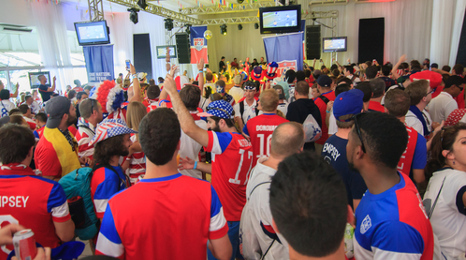Automakers Bet on World Cup Craze — And Win

By subscribing, you agree to receive communications from Auto Remarketing and our partners in accordance with our Privacy Policy. We may share your information with select partners and sponsors who may contact you about their products and services. You may unsubscribe at any time.
CARY, N.C. –
A substantial American viewership for the 2014 World Cup was expected — but the resulting record-breaking number of people tuning in to the tournament shattered all expectations. And the car brands who may benefit the most? Kia, Hyundai and Volkswagen.
Over 26 million people in the U.S. viewed the World Cup Final between Germany and Argentina, averaging about 17.3 million on ABC (English) and 9.2 million on Univision (Spanish), the most to ever watch a single soccer game in America, according to those respective networks.
To put that into perspective, the last Super Bowl peaked at about 111.5 million American viewers, according to Nielsen ratings. And that was just one game, with an estimated 115 million viewers during the first 62 of the 64 World Cup games, on ESPN, ESPN2 and ABC alone, not taking into account viewers tuning in via various streaming methods or participating in public viewings.
According to a study from Jumpstart Automotive Group, which compared online traffic during the World Cup (which ran from June 12 through July 9) to the 30 days prior to its commencement, their family of publishing sites saw dramatic increases in Web activity related to the three automakers who made World Cup advertising their priority.
Kia, which featured Brazilian model Adriana Lima in its spots, saw the biggest bump in digital traffic with a 32-percent increase in interest while the World Cup was open.
Hyundai, who is the current official auto sponsor for the World Cup, saw a 31-percent increase in Web traffic on Jumpstart’s collection of sites. The automaker also experienced significant interest increases with their social media efforts, finding success via Tumblr and Twitter with their #BecauseFutbol hashtag, the latter maintaining a 30-percent share of the conversation versus other official World Cup hashtags.
Subscribe to Auto Remarketing to stay informed and stay ahead.
By subscribing, you agree to receive communications from Auto Remarketing and our partners in accordance with our Privacy Policy. We may share your information with select partners and sponsors who may contact you about their products and services. You may unsubscribe at any time.
Volkswagen, competing with the South Korean sister companies, viewed the World Cup as the perfect opportunity to market the 2015 GTI. As an unofficial sponsor, VW drummed up a 26 percent increase in digital interest via three official people: current ESPN analysts Alexi Lalas (former U.S. international player) and Michael Ballack (former German international player) along with Argentinian commentator Andres Cantor. Featuring figures from each of the two countries that played in the final was just convenient icing on the cake.
Perhaps even more convenient is the timing for Chevrolet, who timed the unveiling of the 2014-15 Manchester United kit perfectly in tune with the World Cup final, seeing an increase in 17-percent in online traffic. The automaker’s $559 million deal with the British giants will ensure seven years of world-wide exposure on the front of the Manchester United jerseys despite the fact General Motors announced last year it will stop selling new Chevrolets in Europe by the end of 2015, in an attempt to shift European focus to Opel.
To read Jumpstart’s World Cup Report in full, click here.


